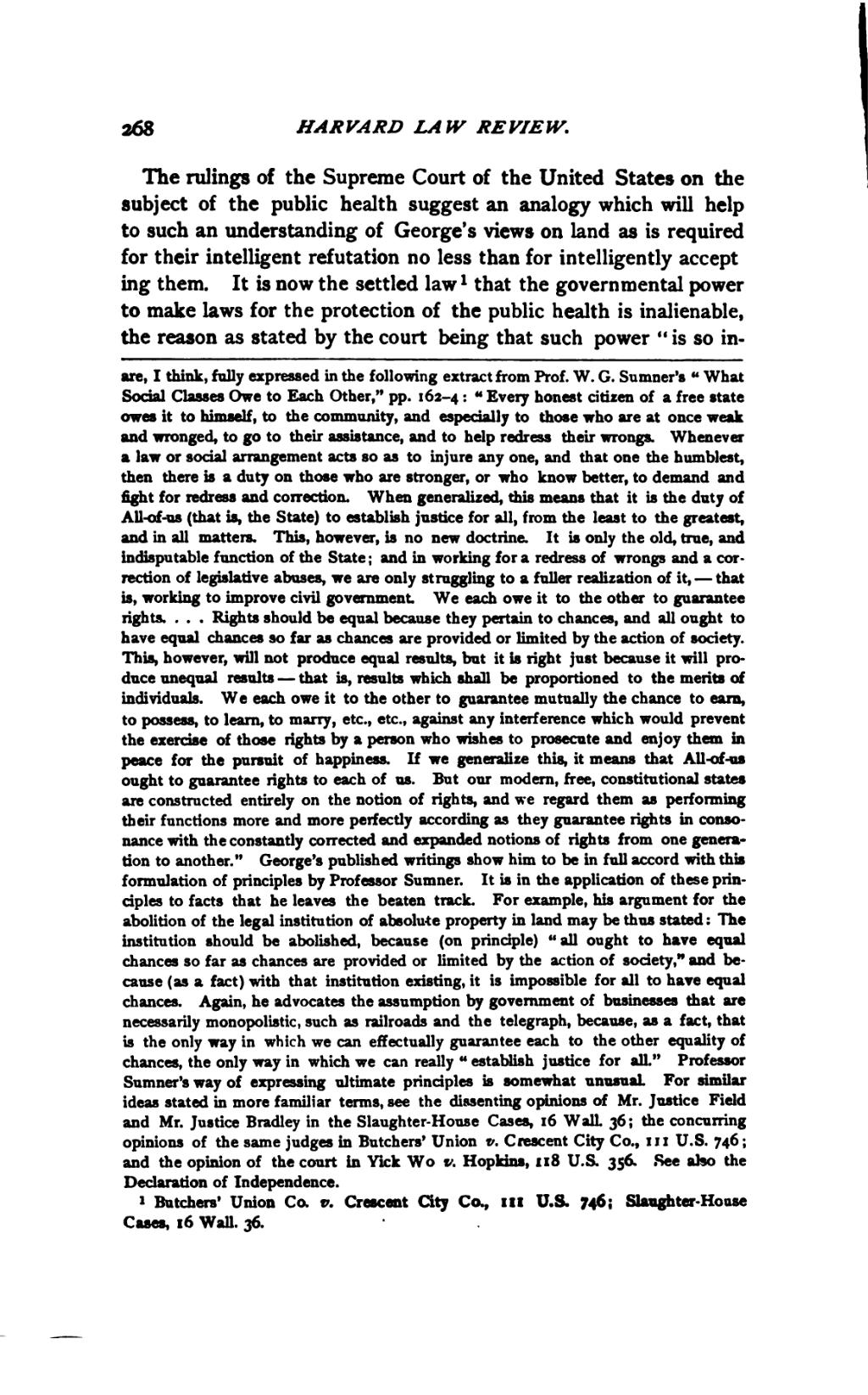The rulings of the Supreme Court of the United States on the subject of the public health suggest an analogy which will help to such an understanding of George’s views on land as is required for their intelligent refutation no less than for intelligently accepting them. It is now the settled law[1] that the governmental power to make laws for the protection of the public health is inalienable, the reason as stated by the court being that such power “is so in-
- ↑ Butchers’ Union Co. v. Crescent City Co., 111 U.S. 746; Slaughter-House Cases, 16 Wall. 36.
are, I think, fully expressed in the following extract from Prof. W. G. Sumner’s “What Social Classes Owe to Each Other,” pp. 162–4: “Every honest citizen of a free state owes it to himself, to the community, and especially to those who are at once weak and wronged, to go to their assistance, and to help redress their wrongs. Whenever a law or social arrangement acts so as to injure any one, and that one the humblest, then there is a duty on those who are stronger, or who know better, to demand and fight for redress and correction. When generalized, this means that it is the duty of All-of-us (that is, the State) to establish justice for all, from the least to the greatest, and in all matters. This, however, is no new doctrine. It is only the old, true, and indisputable function of the State; and in working for a redress of wrongs and a correction of legislative abuses, we are only struggling to a fuller realization of it, — that is, working to improve civil government. We each owe it to the other to guarantee rights. . . . Rights should be equal because they pertain to chances, and all ought to have equal chances so far as chances are provided or limited by the action of society. This, however, will not produce equal results, but it is right just because it will produce unequal results — that is, results which shall be proportioned to the merits of individuals. We each owe it to the other to guarantee mutually the chance to earn, to possess, to learn, to marry, etc., etc., against any interference which would prevent the exercise of those rights by a person who wishes to prosecute and enjoy them in peace for the pursuit of happiness. If we generalize this, it means that All-of-us ought to guarantee rights to each of us. But our modern, free, constitutional states are constructed entirely on the notion of rights, and we regard them as performing their functions more and more perfectly according as they guarantee rights in consonance with the constantly corrected and expanded notions of rights from one generation to another.” George’s published writings show him to be in full accord with this formulation of principles by Professor Sumner. It is in the application of these principles to facts that he leaves the beaten track. For example, his argument for the abolition of the legal institution of absolute property in land may be thus stated: The institution should be abolished, because (on principle) “all ought to have equal chances so far as chances are provided or limited by the action of society,” and because (as a fact) with that institution existing, it is impossible for all to have equal chances. Again, he advocates the assumption by government of businesses that are necessarily monopolistic, such as railroads and the telegraph, because, as a fact, that is the only way in which we can effectually guarantee each to the other equality of chances, the only way in which we can really “establish justice for all.” Professor Sumner’s way of expressing ultimate principles is somewhat unusual. For similar ideas stated in more familiar terms, see the dissenting opinions of Mr. Justice Field and Mr. Justice Bradley in the Slaughter-House Cases, 16 Wall. 36; the concurring opinions of the same judges in Butchers’ Union v. Crescent City Co., 111 U.S. 746; and the opinion of the court in Yick Wo v. Hopkins, 118 U.S. 356. See also the Declaration of Independence.
